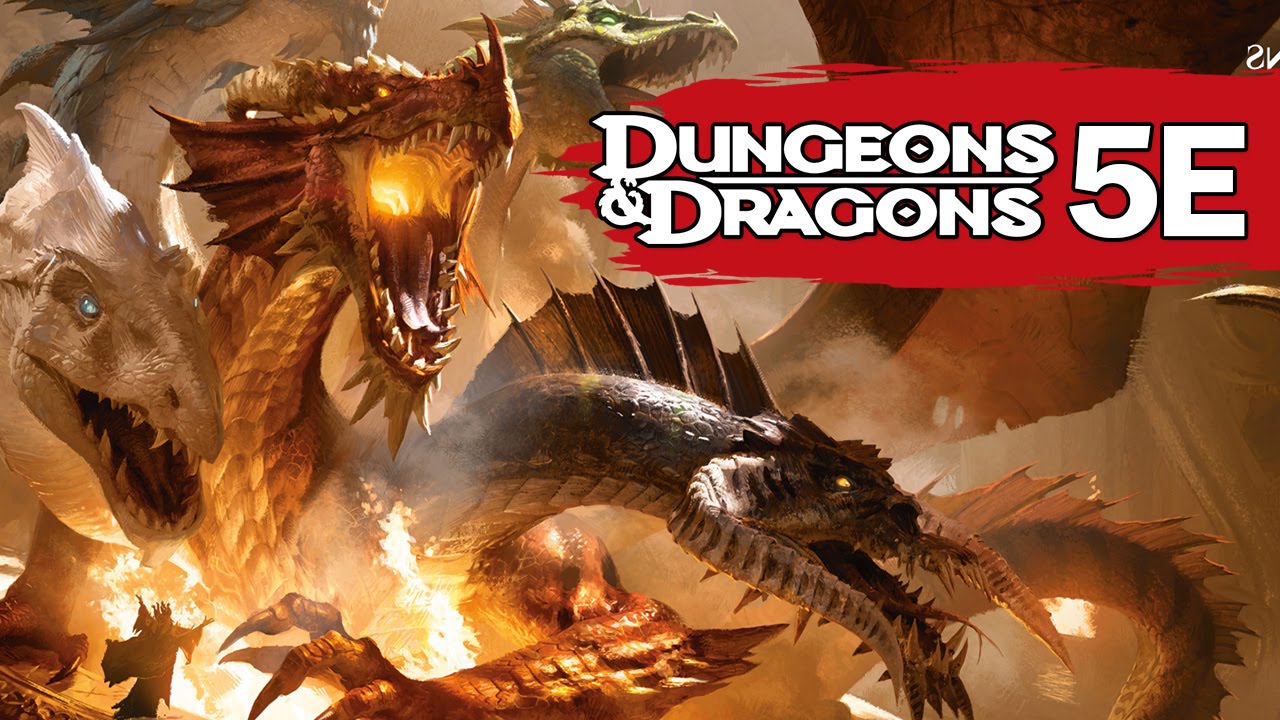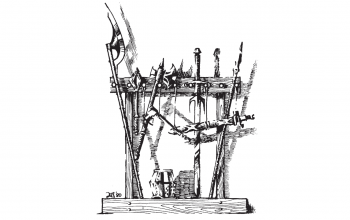
I ran my first game of 5th edition D&D last Sunday night. My regular Sunday night group has decided to switch from Demon wars to D&D, and as I’ve said in the past I like playing with that group enough to be content with whatever system they choose. The group is also full of DMs and likes to rotate who runs, so inevitably my turn was going to come up. I figured I could use the practice for my upcoming work game anyway, and I have to say that my overall impression is: not bad.
Of course I’m still bringing my old school style to the table, and that may at some points clash with the newer rules set. I’m sure we’ll work it out as we go. For now though, here are some very quick first impressions after my very first session behind the screen with 5th edition:
What I Like
Quick Combat – I was surprised that combats went pretty darn quickly. Now, I was using group initiative and go around the table, and I’m not sure how much the players did or did not like that. It’s possible I’m taking away some player’s chance to shine if high initiative is considered a perk of some class or race or whatnot. Also I’m concerned that as we go up in level (my group is currently only 2nd level), the volume of options per-player may slow things down. But for now at least, I was pleasantly surprised at how quickly combat went. Not as snappy as OED, but still reasonably quick.
Abstracted Skills – As you guys know, I’m no fan of skill systems. I much prefer an immersive approach where players interact with the world more and their character sheets less. I therefore found myself pleasantly surprised with how abstract the 5e skill system is. Gone is the giant list of skills which must be bought per-point each time you level. Instead what we have is a list of 20 or so skills that are tied ability scores, and a list of which skills your character is “proficient” in (giving you a set bonus on that roll). It smells a bit 2nd-edition-ish, and personally I feel like I can see through the matrix a bit at what is really just a mechanism for making ability checks with a bonus applied if it’s “in fiction” for your character to be good at that thing. While I personally would prefer no skill system at all, I do think this is an improvement over 3rd edition, which I happily played for quite some time.
Cantrips – I am surprised to say that I rather like that spell casters were given very minor magic that they can do indefinitely. Most spells are still limited in a quazi-Vancian way, but every spell caster has a couple of “cantrips” that they can use every round. The effects are well balanced to be pretty trivial in nature. The few that cause damage are no better than throwing a dagger, and isn’t just a bit cooler to have your magic-user tossing little bolts of magical fire than daggers? Surely this feels better than a world where every ancient arcane sage is also a darts champion.
Backgrounds – You know what, I really like these random little nuggets of pure roleplay hooks. I love that they’re on random tables, and that they have pretty much no actual game mechanic impact. They are kind of fantastic at taking my character from “generic 1st level elven magic-user” to something with a little personality, and without leading me down the trail of writing paragraphs of back story. The touches are just light enough to be interesting without becoming overbearing.
What I Don’t Like
Weird Races – Ugh, why did they have to add so many weirdo races? Even without all the add ons of cat people and tortles, the base player’s handbook includes tieflings and dragonborn. My major problem with these races is how synthetic they feel. The usual fantasy races are at least bound in cultural and literary tradition. The newer races just feel so meta, and I don’t understand how they fit in when world building. And while one “unusual” creature in a party can seem kind of cool, when the whole party is this strange menagerie of non-humans, it just feels awkward to me.
Challenge Ratings – I didn’t like this system in 3e and I don’t like it in 5e. It feels to me like a false sense of security, like somehow by using this simple calculation I can ensure I’m going to have a perfect encounter that feels challenging but definitely won’t TPK my party. Guess what – it feels challenging when there is definitely a chance of TPK. That’s what makes it fun! And as Delta has pointed out, systems like this are just inherently broken. Personally, I’d rather just put what monsters in place make sense to the setting, and make sure the players have some means of escape when they find themselves in over their heads.
Attacks of Opportunity – Can we just stop with this? Please? It neither adds to the realism nor the fun.
Number Scales – Both money and hit points are just immediately using values that I consider silly. A kobold does d4+4 damage – a kobold! There is nothing in the game that is doing a straight d4 or d6 of damage, that is laughably insignificant in the hit point numeric scale. Your average 1st level treasure includes 1,050 silver pieces and 70 gold pieces. I’m amazed at how value-less silver is in this world.



The reason comabat went quickly is 100% because you didn’t use Initiative as written. It is a slog RAW.
I’d agree there. I’ll concede that we have a big party (6-7 usually) but it really can drag. Not as bad as 3e but still a slog sometimes.
I ran another game last night, and I tried it with the regular initiative system. I even used the little cards-on-the-screen system to try and speed it up. Ultimately, I think you’re totally right, it was kind of slow and I’ll be moving back to group initiative.
That’s pretty similar to my thoughts on 5e! It’s my favourite flavour of d20 but d20 is my least favourite system, so for me it sits firmly in “I’ll play it.”
My group (some of my group) are 5e nuts so I think it will be hitting our table for a while yet.
Yeah, the popularity of it makes it pretty hard to avoid at this point. I figured rather than continue to grump about it I should give it as fair a pass as I can. I happily played 3e for many years, and though I don’t think I’d choose it today, I quite enjoyed those games at the time.
What level were you running at? 5E is perfectly decent at 1st level but I’m sorry to say I’ve had an increasingly negative experience with increasing experience levels, and we’ve had to make a number of major rules changes in our group.
I have two groups — one is first level, the other is 2nd about to cusp 3rd. Another friend has told me that it becomes very unbalanced after 7th level. I guess I’ll find out soon enough.
I gather you’re an old-school D&Der, what would you recommend from the old (or OSR) versions as I haven’t played anything pre-3e?
First off, I think Matt Finch’s Old School Primer is a great work that is targeted at folks just like yourself that have only played the new stuff. It’s really nice at picking out the big ticket differences between play styles.
If you’re looking for a game to sink your teeth into, while Wizards has released the old books as PDF, I think some of the retro-clones may actually be a bit more approachable. Swords & Wizardry is a good choice, there’s even a free “light” version that really pares it down to just the rules. Though I think while that’s a good table reference, it maybe lacks any guidance on how to put them to best use.
And for an adventure to run, my favorite is to poke through the winners of the One Page Dungeon Contest. Goodman Games also puts out some great adventures in their Dungeon Crawl Classics line.
Forgot to say thanks for this, I have been reading the primer with interest!
Awesome! Would love to hear your thoughts.
8 posts already! 5e has angried up the blood 🙂
I think there is a good core to 5e that one can run an Old School styled game in, and in a different publishing environment, someone would probably have written that game by now.
I am sorry we did not get the Base Game plus modular complexity that was presented early in D&D Next’s development.
I think the skill system is a decent compromise between 3e list of skills, 2e 100 overlapping proficiencies, and a totally open everything is just an ability check approach.
Combat will slow down as they level up and folks try to maximize, synergize their abilities, bonus actions, etc.
Crazy races? Well D&D went from Conan and Tolkien, to Dragonlance and Drizzt, and is now full blown Manga. “The Kids” like their Demon Girls, Cat Dudes, and Space Robot wizards. 🙂
At best I think CR is an attempt to do like Delta’s EHD work, trying to get an idea of how deadly something might be, but it is a mistake to take it as a safe operating limit.
At this point I feel I have ended up damning with faint praise, so i guess I should stop.
You know, maybe a slightly controversial topic will help my metrics a bit. 🙂
And yeah, I think you’re pretty much on the money here. It could be that 5e will always benefit from the incredibly low bar set by 4e for the old school crowd.
I’ve been playing in a 5e game for a few months and combat isn’t really fast at all. We have 2-3 hour sessions and those times where we do have combat encounters, the combat takes at least an hour, and this is with only 3 PCs.
That’s disappointing to hear. How many players do you have? Are there any techniques you’ve found that have improved the speed at all?
I have a blog post on this point! See… wait, you already included it, thank you. 🙂
Oops! Did not read this post before I fired off my 5E rant on your latest post. Probably should have written all that here.
Here’s the funny thing about THIS post: when I look at the things you LIKE (and I *do* respect your opinion, Paul…) I notice:
– You cite a “fast combat system” that your commentators say is actually slow if played the way the game is designed.
– You cite the skill system as something you like, but simultaneously state you’d prefer NO skill system (you only seem to “like” that is not like earlier editions’ systems).
So what you’re left with is an appreciation of different “color” for dagger-throwing mages and background “nuggets” on random tables.
Paul that is crap as far as reasons to play 5E, man. You write “overall impression: not bad.” Really? It’s not bad? Is it good? When I see that the “Not Likes” category of your post includes: races (kind of inherent in chargen), challenge ratings (the whole of the advancement system), and “number scaling” (especially as it relates to damage and treasure…kind of Big Parts of the whole game/genre!) PLUS factor in the skill system you’d prefer not to be there and the combat system that you have to change to make it run effectively…well, hmm. Is it really “not bad?”
Just trying to look at this objectively. Tell me, Paul…tell me WHY I should play this game. Tell us WHY you are playing it. Because it’s the popular thing at the moment and you wouldn’t have players otherwise? Because you LIKE the new systems and it’s just a matter of time before you “get the hang of it?” Because you’re trying to stay young and hip and fresh and change is inevitable? I mean, what is it about 5E man…convince me to embrace it! Because random background nuggets and cantrip daggers aren’t enough.
Since I don’t play 5E and you do and I respect your opinion (the reason I continue reading your stuff and watching your videos), give us the real skinny. Give us the honest truth of the matter. Do you believe in 5E? If so, why? If not, why the hell are you playing it? And why are you telling us it’s “not bad” in one paragraph and then citing…well, a lot of stuff I’d consider to be kind of bad.
OK, so, first off let me just say that I’m absolutely not trying to convince anyone to play 5e. My blog is written with a heavy dose of introspection, and I write about the games I’m playing. I happen to be playing a bunch of 5e right now so that’s what’s on my mind. That doesn’t mean I’ve given up on old school systems, far from it, as you’ll see reflected here once my birthday rolls around and I spend 4 straight days running an OED game.
So why am I playing 5e? That’s the real question. I did not seek it out, it kind of weirdly fell into my lap, and a double or even triple dose of it at that. First off, my Sunday group was playing Demon Wars, which is also a much more new-school kind of game and I’ve posted about that in the past. Ultimately my take on that game is that I so enjoy the group of players that I’m happy to play whatever it is they want to play. We also happen to play in a rotating-DM style of game, where each DM runs for a couple weeks then hands off the reigns to the next one, so whatever we play I’m on the hook to run as well.
I figured 5e vs. Demon Wars wasn’t a huge trade-off, and as a connoisseur of roleplaying games I am happy to try just about any system and attempt to bring as open a mind as possible to each new one I try. In fact, writing about the new system I’m trying here on this blog is a means for me to refine my opinions, and sometimes it takes a while for me to crystalize my thoughts. So, you can expect more 5e related posts in the near future as I bring an academic eye to the system.
Now the other thing that very coincidentally reared its head at the same time is work related. I work in the video game industry, specifically making RPG style games, which is definitely a different beast than tabletop RPGs, but they’re still pretty strongly influenced by each other. So being up on the latest tabletop RPG system is in some way work related research for me. As I mentioned in my first West Maches post, the idea to run this game came up from a discussion around social meta-game mechanics for online mobile games.
That means there’s an angle of work related research to the West Marches game not only for me, but also for all the players. That actually kind of helps the motivation level quite a bit, which in the past was an issue when I tried to run West Marches using B/X. So, if 5e is the consession I need to make to run a style of game I’ve always been curious to run with a much larger and more motivated group than I could get otherwise, well, that’s a pretty easy consession for me to make. Right now we have 22 people in our West Marches chat, and I’m about to run my third session in a little over a week. It’s crazy, it can’t possibly last, it will possibly break me – but damn it it’s weird and fun and I’m going to see how long I can hang on.
Let me end then with an honest account of what I think of 5e – I stand by my quote of it’s “not bad”. For me, “not bad” is also “not good”, it’s somewhere in the middle. On a scale of 1 to 5 it’s a 3. I actually kind of like it more than 3rd edition, which surprised me, as I spent many years playing 3rd edition back when it first came out and that was my “middle of the road” game for a long time. It was 3.5 and 4 that sent me away from D&D to find other systems, and only after a long hiatus playing Savage Worlds did I finally discover old school. I’d still rather play OD&D, or B/X, or any such variant over 5e, but I’d rather play 5e than 3 or god forbid 4. I promise you will never see anything 4e related here, I don’t have anything nice to say so I’ll say nothing.
So there you have it. I’m sorry if my playing 5e makes you sad. I’m sure I’ll have more to say about it in the coming weeks, but maybe you can ignore that bit and focus on the craziness of running a 22 player West Marches game. And just wait, I’ll have more old school posts in the future.
It doesn’t make me sad. Frustrated I suppose. People who write about playing an older edition D&D, but then playing 5E and promoting it as being reasonably good mainly on the merit that it’s better than the last couple editions, rather than, say, its OWN merits. My opinion of 5E is extremely low and yet I keep reading and hearing about how everyone is playing it and how awesome it is…and I just don’t see it (not even when I dig into their actual posts…like I did with this one). Much of the time I feel like the dude yelling that the Emperor has no clothes, except everyone is just telling me “chill dude, at least we have an emperor.” Or something.
Ah, well…perhaps I simply envy your freedom to game. I don’t have that myself, at the moment.
Best of luck with your experiment!
Compromise is the reason I play 5e. Personally I also think it’s “not bad” – i.e. not good either – but people in my group want to play it and, if I’m not running a game, it’s what they tend to play. I’d give it a 2, but then d20 isn’t my favourite system to begin with – I prefer percentile. I’ll still take playing 5e over not playing though, any day.
I’m trying to expand their horizons, I’ve played (and blogged about) loads of systems and there are many out there that are subjectively better than 5e but it’s just getting other people to play them!